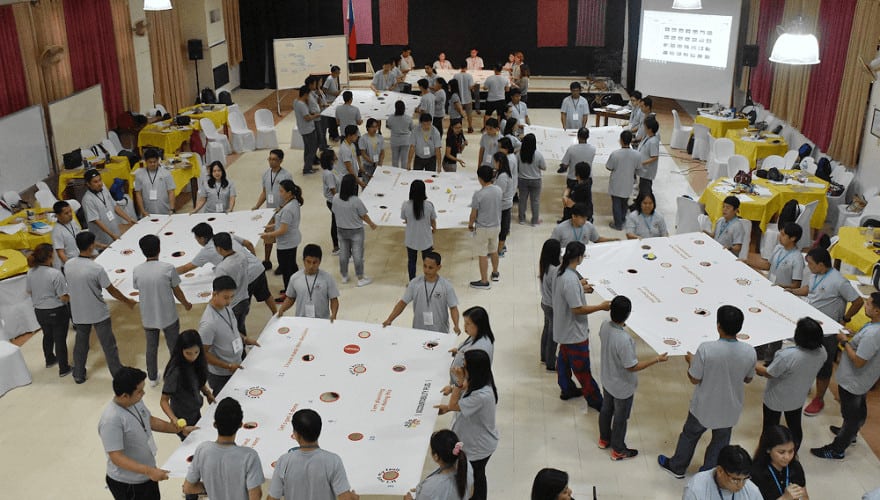Pakikisama can build social harmony at work—but when you misuse it, it turns into silence, people-pleasing, and “go with the flow” decisions that let bad habits survive. In this article, Jef Menguin shows how to keep pakikisama healthy: cooperate, stay respectful, and still speak up when something is wrong. Practice it and share it with your team so you protect relationships and protect standards.
Pakikisama is a Filipino cultural value prioritizing harmony in interpersonal relationships through cooperation and compromise. Its inherent benefit is the promotion of group unity and social cohesion. However, when abused, it can lead to the suppression of individuality and the perpetuation of unchallenged, harmful norms.
Pakikisama may force one to keep quiet and ignore wrongdoing. At work, the value of pakikisama compels one to play small and not outshine the boss. It may also mean giving up a promotion to give way to a more senior but less capable colleague.
When I was young, I knew my father was known for one trait: pakikisama. He was a friend to many and loyal to his friends. He was a construction foreman and during his days was earning good money. But often, his weekly salary was spent with his friends who loves to drink alcohol for free.
Even though pakikisama is prone to abuse, I believe we can make great things happen with it. It is not a stand-alone value. We must not sacrifice our other values to feel that we belong. In this article, we will dig deeper and explore ways to become better citizens.
Understanding Pakikisama
The root word of pakikisama is sama which means join. The prefix paki makes the word mean “to join”. In the Filipino context, it means to “join the group and yield to the majority so everyone agrees to the same decision”.
At first glance, this is all positive. For example, a team that works in the same direction is likely to succeed.
The problem with pakikisama is when you decide in favor of the majority so as not to rock the boat, not hurt the feeling of someone, or be separated from the group. This kind of pakikisama may force you to sacrifice your values and allow what is obviously wrong.
To the youth, this is called peer pressure. Or playing like a passive bystander when there is bullying.
I’ve been conducting capability building for government employees. There are offices that consider each employee as a professional worker. And there are where those in power are associated with the executives.
I heard of employees who forgo possible promotions for the sake of pakikisama. For this reason, we often see ill-equipped employees get juicy positions.
It is crucial to balance pakikisama with other Filipino values:
- matino (sensible person),
- maasahan (accountable)
- may pananagutan (responsible)
- prinsipyo (integrity)
- malasakit.
There are four reasons why we value pakikisama.

Cultural Roots and Influence
Filipinos value their bayan (community) and kababayan. We value the concept of bayanihan which means working together for the common good. This sense of togetherness has shaped our cultural identity and instilled the value of pakikisama in us.
In small barangays (villages) across the Philippines, when a family needs help in building a house or planting crops, the community comes together to assist. We call this bayanihan.
Kabayan Mindset
Filipinos deeply value the idea of belonging to a group. We find comfort and security in being part of a close-knit community. This sense of belongingness allows us to establish strong bonds and foster a sense of camaraderie with our family, friends, and neighbors.
When I was young, I remember our neighbor, who shared their sinigang na bangus and whatever food they have during lunchtime.
We like to celebrate our life together with others. We recognize our kababata (those we grew up with) and our barkada (circle of friends).
During festive occasions, such as fiestas or birthdays, Filipinos often gather together to celebrate, share food, and enjoy each other’s company. People invite even strangers to their houses. This celebration of togetherness highlights the significance of pakikisama and pakikipagkapwa-tao.
Strengthening interpersonal relationships
Pakikisama is a fundamental aspect of interpersonal relationships in the Philippines. It involves being considerate, respectful, and empathetic towards others.
By practicing pakikisama, Filipinos build trust and rapport with those around them. A good Filipino is someone who does not hurt the feelings of others.
In a workplace setting, colleagues are expected to be cooperative, willing to help each other, and create a harmonious environment conducive to productivity. New employees go where others go.
Promoting harmony and cooperation
Filipinos have the ability to foster harmony and cooperation within communities. By prioritizing collective welfare and maintaining harmonious relationships, we can work together towards common goals.
When faced with challenges or disasters, Filipinos are known for their bayanihan spirit, coming together to help those in need. This collective effort demonstrates the power of social harmony in action.

Preserving Pakikisama
Values shape our way of life. It helps us make difficult decisions. At its worst, it makes us decide without thinking of the consequences.
When I was teaching, when students cut classes they say “napasama lang po“. It is as if they’re dead fish in a river. When bystanders side with the bullies, they also think they just want to belong (to whoever is on top).
It is said that we love the underdogs. Not always. There are times when many of us side with the corrupt but powerful and join them in putting down victims. This reminds me of a President who causes the death of 30,000 people.
But despite all of these, there are more positives to pakikisama that we should maintain.
Define the positive aspects of maintaining it.
While pakikisama is a cherished Filipino value, it is crucial to understand its positive aspects. It involves being respectful, considerate, and cooperative towards others. Pakikisama helps build strong relationships, promotes a sense of unity, and fosters a supportive community.
Maintain integrity while practicing it.
It is important to note that practicing “Pakikisama” does not mean compromising personal values or integrity.
True “Pakikisama” values honesty, fairness, and justice. It requires finding a balance between maintaining harmony and standing up for what is right.
Strike a balance between personal values and collective harmony.
While “Pakikisama” emphasizes unity and cooperation, it is essential to strike a balance between upholding personal values and maintaining collective harmony.
It means being respectful and considerate without compromising one’s principles or turning a blind eye to wrongdoing.
Imagine a situation where a colleague engages in unethical behavior at work. Practicing “Pakikisama” does not mean staying silent or condoning misconduct.
Instead, it involves addressing the issue tactfully, while still valuing the importance of harmony and collaboration.

Recognizing and Addressing Misuse or Abuse of Pakikisama
I don’t think values can be enhanced. Either you practice it well or you don’t. You can always replace your values with another. It begins with a change in mindset.
I mentioned this because pakikisama is often included in the WAVE curriculum.
Another way is to consider a set of values working together. A person who considers himself matino (read: a person with intelligence and integrity), won’t go with the wrongdoers.
Identify situations where it can be exploited
Unfortunately, there are instances where the concept of pakikisama can be misused or abused. Some individuals may take advantage of it to manipulate others or perpetuate wrongdoing.
It is crucial to be aware of these situations and recognize when “Pakikisama” is being used inappropriately.
In some cases, people might pressure you to remain silent about corruption or misconduct in the workplace, citing “Pakikisama” as a reason to avoid confrontation or reporting wrongdoing.
Stand up against wrongdoing without compromising harmony.
Respecting pakikisama does not mean turning a blind eye to injustices. It is possible to confront wrongdoing while still embodying the values of unity and cooperation.
By addressing issues respectfully and constructively, we can contribute to positive change without jeopardizing the spirit of communal harmony.
When faced with a situation where someone expects you to ignore wrongdoing for the sake of pakikisama, you can assertively express your concerns, suggest alternative solutions, and emphasize the importance of maintaining integrity within the group.
Handling workplace dilemmas involving it.
To navigate workplace dilemmas where “Pakikisama” is being misused, consider the following suggestions:
- Foster open communication: Encourage a work culture that values dialogue and encourages individuals to speak up respectfully.
- Promote ethical leadership: Emphasize the importance of ethical behavior from supervisors and managers, setting a positive example for the rest of the team.
- Seek support from allies: Connect with like-minded colleagues who share your values and collaborate to address issues collectively.
- Educate and raise awareness: Promote discussions and workshops on ethical practices and the appropriate application of “Pakikisama” within the workplace.
Practicing Pakikisama as a Respecting and Recognizing Trait
It is important that we respect each other. When we pursue harmony we can celebrate our differences. We can turn our conflicts into collaboration.
It all begins by respecting who we are and recognizing the value of each other.
Respect the worth and contributions of individuals
Pakikisama goes beyond mere cooperation; it involves acknowledging and valuing the worth of each individual. By recognizing the unique strengths and contributions of others, we foster an inclusive environment that appreciates diversity.
In a team project, practicing pakikisama means appreciating the different skills and perspectives of team members and creating an atmosphere where everyone feels valued and empowered.
Empathy and understanding
It requires empathy and understanding toward others. It means putting ourselves in someone else’s shoes and considering their feelings, experiences, and challenges.
By cultivating empathy, we build stronger connections and promote a culture of support.
When a colleague is going through a difficult time, offer a listening ear, provide support, and show understanding instead of passing judgment.
Collaborative Problem-Solving
Another aspect of pakikisama is the practice of collaborative problem-solving. Instead of blaming or pointing fingers, individuals who embrace it work together to find solutions that benefit everyone involved.
This approach fosters teamwork and strengthens relationships.
In a work setting, when faced with a challenge or disagreement, gather input from all parties, actively listen, and find a resolution that considers everyone’s needs and perspectives.
Building a supportive and encouraging environment
“Pakikisama” thrives in an environment that is supportive and encouraging. By uplifting and motivating others, we create a space where individuals can grow, succeed, and feel valued.
Celebrating each other’s achievements and offering support during setbacks strengthens the bonds within a community.
In a classroom setting, encourage classmates, share knowledge, and help each other succeed academically. It creates an atmosphere of collaboration and mutual support.
Pakikisama in Business
In a business, pakikisama can have a positive impact on teamwork, collaboration, and the overall workplace atmosphere.
Here are three ways to use “pakikisama” in business:
Building Strong Teams
Pakikisama can be used as a guiding principle when building teams within a business. It can help to foster an environment where everyone feels respected and valued.
In practice, this could mean implementing team-building activities that focus on developing mutual understanding and cooperation or adopting management strategies that prioritize group harmony and collective decision-making.
Networking and Relationship Management
The concept of pakikisama can also be applied to networking and building relationships with other businesses, clients, or stakeholders. It emphasizes the importance of maintaining good relationships and reciprocating gestures, which can help a business to build strong, beneficial partnerships.
For instance, this could involve attending social events, showing interest in others’ activities, and making an effort to understand and meet their needs.
Conflict Resolution
Pakikisama can be a useful tool in conflict resolution within a business. Promoting the values of understanding, respect, and unity, can encourage individuals to find solutions that are beneficial to everyone involved rather than focusing on personal gain.
This might involve promoting open and respectful dialogue, seeking to understand the perspectives of all parties involved, and working towards a solution that maintains group harmony.
To effectively apply pakikisama in business, it’s crucial to remember that it’s not about blindly conforming or suppressing individual opinions for the sake of harmony. Rather, it should be used to foster a culture of respect and understanding, where everyone’s voices are heard and valued.
VI. Conclusion
In Filipino culture, “Pakikisama” is a value deeply ingrained in our society. It promotes unity, cooperation, and the establishment of harmonious relationships.
While it is essential to preserve the positive aspects of social harmony, we must also recognize and address its potential misuse or abuse.
By striking a balance between personal values and collective harmony, we can navigate workplace dilemmas and stand up against wrongdoing without compromising the essence of “Pakikisama.”
Practicing pakikisama as a respected and recognized trait involves valuing individuals’ worth, cultivating empathy, engaging in collaborative problem-solving, and building a supportive environment.
By embracing these principles, we can contribute to the growth, success, and overall well-being of our communities, both at work and in our personal lives.
If you want Filipino values to show up as real behavior at work…
Let’s turn it into a culture shift experience.
→ Shift Experiences




Can I share this article. How can I save this article